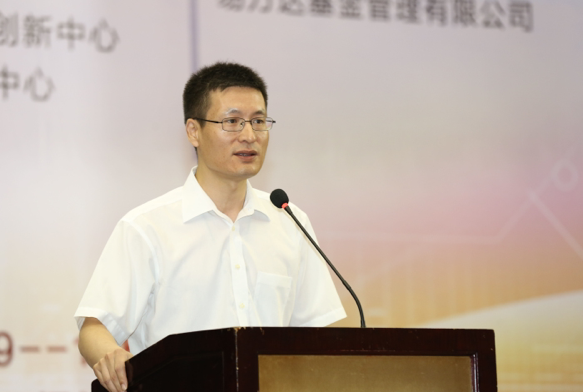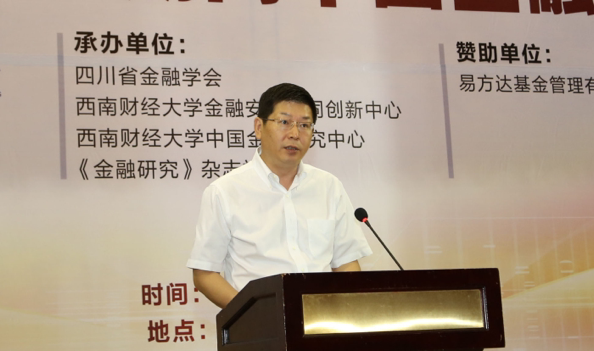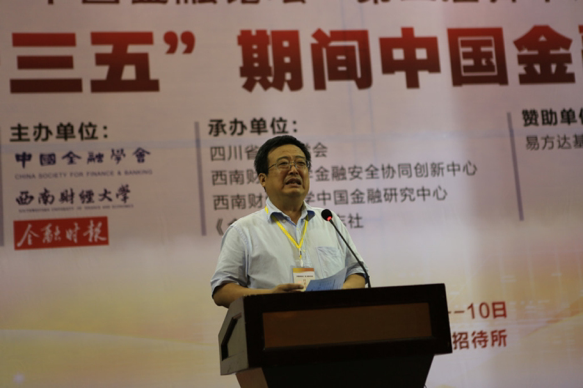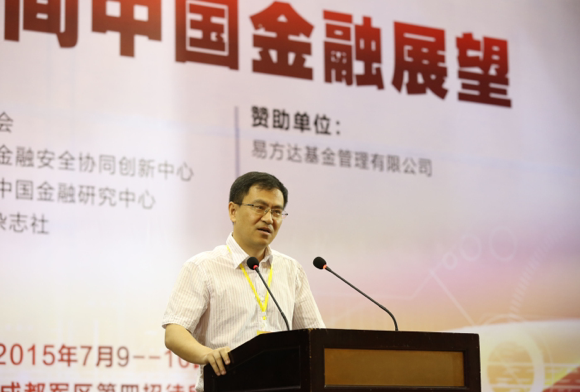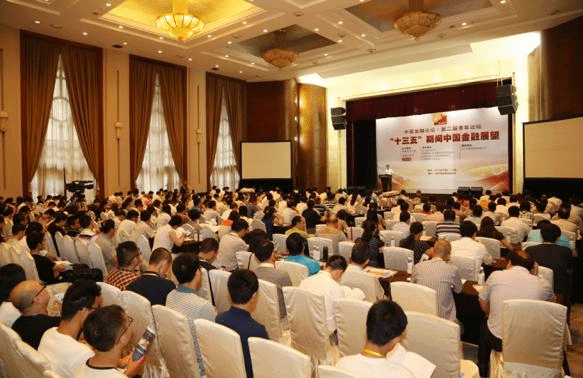From July 9th to 10th, 2015, "The Second Youth Forum of China Financial Forum(CFF)" was successfully held in Chengdu. It was hosted by the Chinese Society of Finance and banking, Southwestern University of Finance and Economics(SUFE), and Financial Times, co-sponsored by the Sichuan Society of Finance and banking, the Institute of Chinese Finance Studies(ICFS) of SUFE, the Collaborative Innovation Center of Financial Security and Journal of Financial Research, and supported by E Fund Today Co., Ltd. More than two hundred young experts, scholars and financial institution managers participated in the forum, including LU Lei, Secretary-General of the Chinese Society of Finance and banking, Director of the Research Bureau of the People's Bank of China, ZHOU Chengjun, Deputy Director of the Second Monetary Policy Department of the People's Bank of China, XIANG Songzuo, Chief Economist of the Agricultural Bank of China, ZHU Haibin, Chief Economist of J. P. Morgan Chase China, GUAN Tao, senior researcher of China Finance 40 forum, Prof. DING Zhijie from University of International Business and Economics, and Prof. WANG Qing from Southwestern University of Finance and Economics and etc. Prof. YIN Qingshuang, vice president of Southwestern University of Finance and Economics, delivered an opening speech, and the keynote speech section was given by Prof. LIU Xiliang.
The theme of this forum placed a large focus on "China's Financial Outlook during the 13th Five-Year Plan". Under the background of the "New Normal", the forum has put forward theoretical proposition strategic planning on the direction of China’s future financial reforms, combing with the domestic and international economic development trends and environments. The forum took the form of both main forum and sub-forum discussing issues such as "China's financial strategy and trends", "China's economic development prospects under the New Normal", "monetary policy and macro-economic control", "financial risks and capital markets" and etc.
1. Macro-economic Control under the "New Normal". Evidence shows that here is no effective coordination between counter-cyclical macro-economic control and pro-cyclical financial supervision. Policy theories based on rational expectations are gradually deviating from practice. First of all, breakthrough in the theoretical research on macro-economic control has not been achieved in recent years. With the inherent framework being difficult to explain the problem of further international division of labor and resource allocation based on Global Value Chains Specialization, so relevant theory is in urgent need to be updated. Second, the financial system itself is unstable. Therefore, macro-economic control cannot take the place of of the market mechanism, which coordinates in line with our goals of market-oriented reforms and further opening-up. The current monetary policy mechanism places too much emphasis on the prevention of systemic risks, which deviates the mechanism from the real economy and results in structural imbalances in return. More indicators of equilibrium should be appropriately introduced, and coordination and cooperation among various regulatory agencies should also be strengthened.
2. Reform of China's Financial Market. Against the background of the bull market expectations from the beginning of 2015 and the recent huge volatility of the "bailout", the participating experts analyzed and summarized their experience and lessons: the basic structure of the capital market is very imperfect, and the implementation of leverage supervision and delisting strategies is lacking so as to lead to volatility and insufficient corporate innovation capabilities, which affects the development of the financial market. The relationship between the stock market and the real economy and the path of influence are still unclear. Although it has an effect on investors’ wealth, the impact on monetary policy still need to continue research; the current "bailout" is a necessary means to maintain market expectations, but expectations themselves are not completely controllable, and the impact of administrative measures on market reforms should be vigilant.
3. The Internationalization of RMB. China’s marketization reform in the field of finance needs to be integrated into the international capital system with a higher degree. Related views on this issue are as follows: the internationalization of RMB is our ultimate destination and guidance along the reform, but there is still a long way to go under the circumstances of opening the capital market the outside world, especially when the RMB is not yet freely convertible. For capital opening, investors care about liquidity, while managers care about stability. Therefore, the exchange rate mechanism under open capital market conditions needs to be redesigned. The huge amount of funds for foreign exchange makes China’s monetary policy very passive with the increasing cost of currency issuance so that rising the demand for the internationalization of RMB. In such case, the central bank should adjust the asset and liability structure. Hence, establishing an open financial system is the key to China's taking back policy initiative.
On the morning of the 10th, 46 colloquium paper authors invited were presented and discussed their papers at the conference under the auspices of the Journal of Financial Research and the ICFS of SUFE.
It is the first time that SUFE hosted the forum, which is conducive to promote the in-depth exchanges of young scholars in the economic and financial fields and to fosters young scholars. The forum provided a platform for the dynamite interaction of young talents in the financial academia and industry in theory and practice discussion. Besides, it also put forward a number of theoretical and policy recommendations for the reform and development of Chin's finance under the “New Normal”.
